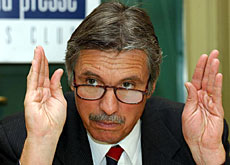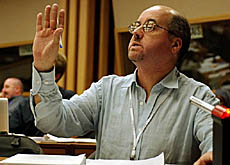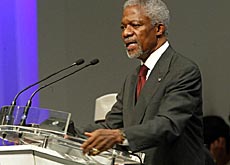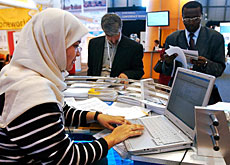Mission accomplished for Switzerland

The World Summit on the Information Society (WSIS) wrapped up in Geneva on Friday with 176 countries pledging to bridge the digital divide.
The Swiss secretary of state to the summit, Marc Furrer, told swissinfo that he was satisfied with the outcome of the first phase of the global gathering.
The original aim of the WSIS was to bridge the digital divide, but negotiations quickly became entangled in thorny issues such as internet governance, human rights and the financing of information technology networks in poor countries.
As the host country of the summit, Furrer and his team from the Federal Communications Office were charged by the United Nations with brokering last-minute talks that eventually resulted in a draft plan of action and declaration of principles, which were endorsed on Friday.
swissinfo: Looking back on this summit and two years of preparations and hard-won negotiations, would you say it was mission accomplished for the Swiss?
Marc Furrer: Generally seen, it was quite successful so our work has been accomplished but, of course, the process goes on [to the next phase in Tunisia in 2005] and Switzerland will follow that as well.
This was Switzerland’s first world summit as a UN member and the Swiss were instrumental in brokering talks on draft documents. Has this highlighted Switzerland’s role as a neutral mediator for diplomatic exchange and even conflict resolution?
M.F.: Very much so, yes. It is the way of our foreign policy to play the neutral mediator. In this case, we had to step in between North and South on the question of financing.
We also had a very difficult discussion about religion – whether we should have included it in the declaration. As a Swiss, you have to have the understanding that an Arab government thinks differently about that than Norway or Britain and it’s important that we have this role of mediator and facilitator.
It is one of the noble roles of our foreign office and we played it here and gained respect for it, so that’s good.
swissinfo: Do you feel that Switzerland initially underestimated the political push needed to agree on a plan of action and declaration of principles, and did this delay reaching a final accord on the draft documents before the summit?
M.F.: Not at all. It was stupid of people from Swiss civil society to say that we didn’t see the political dimension in all of this. These people have never seriously talked to us. There are always some Swiss who are negative and who have to drag things down.
But for me, it was always clear that this process was political… Probably not for the International Telecommunications Union (ITU) or for other countries but for the Swiss government it was always clear. And we fought for political solutions and if we hadn’t, we wouldn’t have had such a political summit.
swissinfo: There were more participants than originally expected, especially from the private sector. Would you say the summit has put Switzerland – and Geneva in particular – on the map as a platform for international dialogue?
M.F.: Yes, I think so, and it was basically one of our aims that Switzerland should become a centre for dialogue for the information society. Just as people think of the environment when they talk about Rio, people will always relate the information society to Geneva and that fills me with a certain sense of pride.
swissinfo: The next phase of the summit is in 2005 in Tunisia – a country criticised by NGOs for stifling freedom of expression. What’s Switzerland’s stance on this and how will the Swiss be lending support to the future of this process?
M.F.: The decision to have it in two phases in Geneva and Tunisia was taken by the ITU and was approved by a resolution of the UN. So in general, the whole process is now under their auspices.
It’s not bad to have one phase of the summit in the North and one in the South. Tunisia has to respect human rights and press freedom but it’s not up to Switzerland to push for that.
It’s now up to all of us to define the strategy to achieve the goals we’ve set, but we don’t have the same responsibilities towards Tunisia that we had in Geneva. The Tunisians wanted to hold the second phase and now the responsibility is in their hands. Of course we will offer advice and our experience, though.
swissinfo: What was the most surprising thing about this summit for you, and what’s the most important lesson that you can pass on to your Tunisian successors?
M.F.: I was positively surprised by the level of interest. The summit [side] events and platforms were fantastic. It was most interesting to see that these kinds of exhibitions have a future [unlike perhaps] traditional telecom exhibitions.
I was also surprised that the most difficult solution we had to find in the end was over financing and not over intellectual property rights or internet governance. I was also pleased by the cooperation among countries. It wasn’t vicious and there was always the consensus that we should find a solution.
swissinfo: You speak about a good turnout but Western leaders were conspicuous by their absence at this summit. Does this signal a lack of support for the summit objectives?
M.F.: We did have a lot of Western ministers, don’t forget. It was also difficult for European Union leaders, who now have their meeting in Brussels, to come. But we did have the French prime minister, Jean Pierre Raffarin, and the leaders of Ireland and Finland.
But you’re right, there was scepticism of these leaders and I hope we can now overcome this. And I think that those officials who didn’t attend have probably seen that it was a mistake not to come and I hope they attend the next phase.
swissinfo-interview: Anna Nelson and Mohamed Chérif
The World Summit on the Information Society wrapped up in Geneva on Friday with the adoption of a declaration and plan of action to bridge the digital divide.
Some 176 countries signed up to the world’s first charter for the cyber age.
As the host country of the summit, Switzerland spent two years preparing for the talks and made a considerable financial, logistical and political investment in the event.
The next phase of the conference will take place in the Tunisian capital of Tunis in 2005.
As host nation, Switzerland was charged with brokering last-minute talks at the summit in Geneva.
The discussions resulted in a draft plan of action and declaration of principles, which were endorsed on Friday.
The Swiss representative, Marc Furrer, said he was satisfied with the outcome of the conference.
The next phase of talks to bridge the digital divide will take place in Tunisia in 2005.

In compliance with the JTI standards
More: SWI swissinfo.ch certified by the Journalism Trust Initiative



You can find an overview of ongoing debates with our journalists here. Please join us!
If you want to start a conversation about a topic raised in this article or want to report factual errors, email us at english@swissinfo.ch.